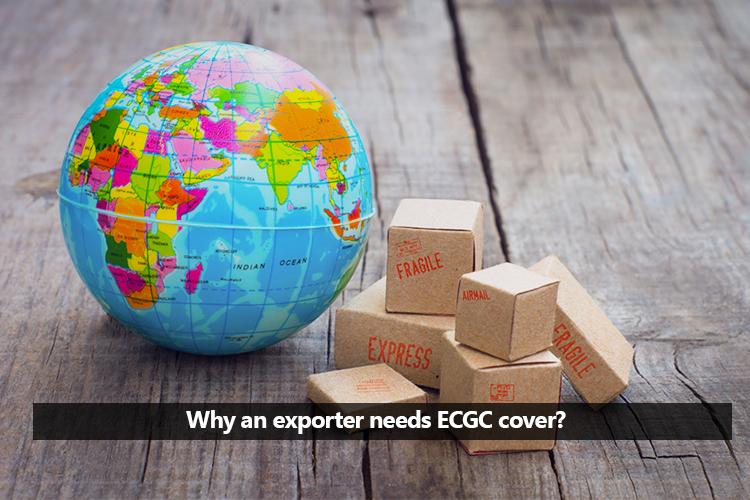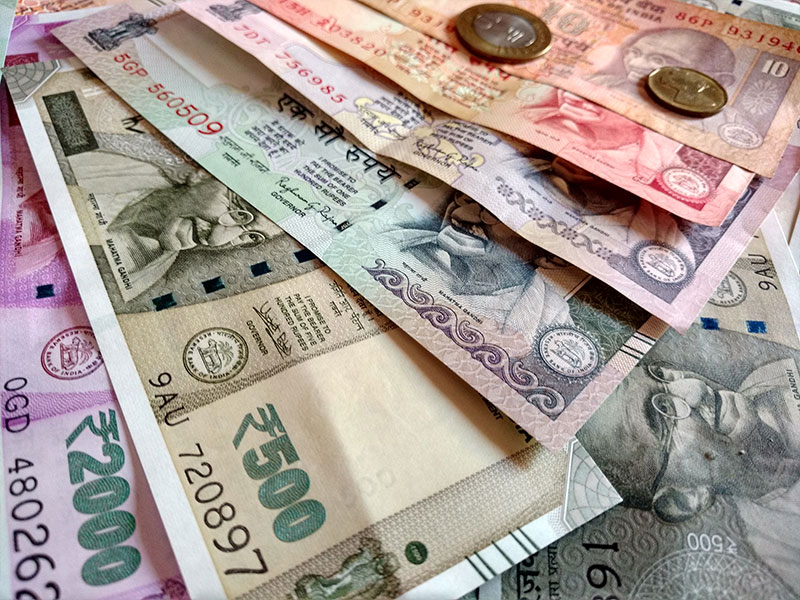An exporter needs ECGC cover for the risk of non-payment by the buyer. The risk of non-payment may be due to political and economic changes all over the world. Political changes like an outbreak of war, civil war, a coup or an insurrection may block or delay payment for goods exported. Likewise economic difficulties or balance of payment problems which may lead a country to impose restrictions on either import of certain goods or on transfer of payments for goods imported. Commercial risks arise due to insolvency or prolonged default of buyers. The commercial risks of a foreign buyer going bankrupt or losing his capacity to pay are aggravated due to the political and economic uncertainties.
The export credit insurance is designed to guard exporters from the consequences of the payment risks, both political and commercial, which enables the exporters to expand their overseas business without fear of loss. ECGC covers Commercial risks under standard policy for credit limits approved by it, on each buyer to whom shipments are made on credit terms. The credit limit up to which it would pay claim on account of losses arising from commercial risks will be fixed by ECGC. Credit limit is ECGC’s exposure limit on the buyer for commercial risks and it is not a limit on the value of shipments that may be made.
The exporter has to apply for a suitable credit limit on each of his buyer. ECGC analyses the credit limit on the basis of credit reports from banks and specialized agencies abroad. The credit limit of ECGC is a revolving limit and once approved, it will hold good for all shipments to the buyer as long as there is no gap of more than 12 months between two shipments. In case of losses due to political risks, ECGC’s exposure is not restricted by the credit limit. ECGC premium to be paid by the exporter, on the full value of each shipment, irrespective of value of the shipment or the total value of the bills outstanding for payment is in excess of the credit limit. For grant of extension of credit period of a DA bill or to convert a DP bill into a DA bill, the exporter must get the prior approval of ECGC and pay additional premium.
Contract policy of ECGC:
The Standard Policy of ECGC usually does not cover pre-shipment risks like ban on export of the item, restrictions on import of the items into the buyer’s country, war, civil war, etc., This is in view of the exporter can sell his products in alternative markets without much loss. However, if the export involves an item, which is manufactured to the non-standard specifications of a buyer, in that event cover available from ECGC under contract policy for the pre-shipment risks as well as the post-shipment risks.
ECGC cover for LC bills:
In case of a shipment against irrevocable Letter of Credit, normally there is no need for applying to ECGC for cover, as payment is guaranteed by the LC opening bank on fulfillment of LC terms. With a view to save premium payable on ECGC cover, many banks do not opt for ECGC cover for bills negotiated by them under L.C. Still there may be the uncertainties due to political disturbances in the buyer’s country when LC is not confirmed by a bank in India. For such shipments, an exporter has option to obtain ECGC cover for either political risk only or for comprehensive risks. Nevertheless, there is a rider from ECGC that cover will be provided by them only if the exporter agrees to get all the shipments made by him against irrevocable Letter of Credit are also covered under their policy. It means cover will not be available for selected transactions.
Why banks need ECGC cover for export finances?
ECGC insurance cover is available for both pre-shipment and post-shipment finances made by the banks. The packing credit advances granted by banks are either covered under specific Packing Credit Guarantee (PCG) or under Whole Turnover Packing Credit Guarantee (WTPCG). If a bank obtains WTPCG, then all the eligible packing credit advances made by it are automatically covered by ECGC. In case of specific packing credit guarantees (PCG), banks have to apply for guarantee from ECGC in a specific format. The post-shipment finance made by the banks is covered under Whole Turnover Post-shipment Guarantee (WTPSG).
Banks have to notify ECGC, in a prescribed format within 30 days for the fresh facilities granted. Banks have to obtain prior approval from ECGC, if the limit exceeds bank wise limit provided by ECGC or in the cases of sub-standard accounts. Following release of advances a monthly declaration should be sent to ECGC along with a premium. A differential premium rate is applicable for the banks which vary between 7ps to 10ps per Rs.100 per month calculated on daily average products. The premium rate for each bank is fixed by ECGC. A differential premium rate is now applicable for the banks, which have opted for WTPCG. The premium rate of WTPCG for each bank is fixed by ECGC on the basis of actual claim of those banks in the preceding 5 years. The percentage of cover is normally 75% for most of the banks (except a few banks for which it is 65%, taking into account the extremely high claim premium ratio of those banks).
ECGC provides WTPSG cover to banks against non-payment of post-shipment credit by the exporters. A differential premium rate is applicable for the banks, 4.5 paise to 6 paise per Rs. 100 p.m. if advances against L/C bills are included for cover otherwise it is 5.5 paise to 7.00 paise depending upon the Claim Premium Ratio for the last 5 years. .The percentage of cover varies from 90% to 95%, in respect of exporters who are policy holders of ECGC, for non-policy holders it varies from 50% to 75%, depending upon the Claim Premium Ratio for the last 5 years.
Overdue report: If the exporter is unable to export/receive payment for export made, within the due date or extended due date then the advance should be treated as overdue and same should be reported to ECGC in the prescribed format within 30 days as ‘overdue report’.
Report of default: The bank has to report the default from any exporter within 30 days of recall of advance or within 4 months from the date of due date or extended due date whichever is earlier. No further payment of premium is necessary.
Claim: Claim should be submitted to ECGC within 6 months of reporting default.
Banks need to send one annual statement of all accounts covered under WTPCG /WTPSG, another one statement of accounts on default for more than three months.
The AD branches of the banks are expected to give due importance to ensure that the export finance made by them are adequately covered under ECGC policies.
Precautions to be taken by banks in respect of settlement of claim from ECGC:
- Before lending to exporters, the financing bank shall ensure that the Directors/Partners/Proprietor/Guarantor is not in the Specific Approval list of ECGC.
- Packing Credit advances made by banks will be normally covered under ECGC’s WTPCG.
- Banks require notifying ECGC, in a prescribed format giving the details of sanction of limits or adhoc limits, within 30 days for the facilities granted. Banks have to obtain prior approval from ECGC, if the limit exceeds Rs.100 lacs before the release of limits.
- If the due date of Packing Credit is to be extended for the advance which is more than 360 days, prior approval of ECGC is required.
- For new accounts and accounts taken over from other banks, prior approval of ECGC is necessary. WTPCG and WTPSG premium is worked out on average daily products.
- All post-shipment including advances against collection bills are required to be covered under ECGC’s WTPSG. In case of LC bills advanced by banks, generally, exporter holds shipment policy of ECGC with adequate drawee wise limits. (banks normally do not take ECGC cover for post-shipment advance against LC)
- If the due date of post shipment advance is extended such that the period of advance is beyond 180 days, prior approval of ECGC is to be obtained.
- Advances against claims for cash assistance and duty draw back should be covered under Export Production Finance Guarantee, if granted at the pre-ship stage under export finance guarantee. For the advance at post-shipment stage separate guarantee should be obtained.
- Advance granted for exports made on deferred terms of payment, turnkey projects, construction works and service contracts at pre-shipment stage should be covered separately for each account, as these will not be covered under WTPCG and WTPSG.
- Letter of Guarantee for export performance/Bid bond guarantee is requires to be covered under Export performance guarantee of ECGC.
- Foreign Currency Loan for financing overseas projects is requires to be covered by Export Finance (overseas lending) guarantee.
- Advances to accounts under Nursing or account classified as sub-standard/bad and doubtful requires prior approval of ECGC.
- When earlier bill has become overdue, branch should have proper justification for handling further bills on such buyer.
- The financing branch should promptly notify the default, if any, to ECGC.
- Claims are to be preferred with ECGC within the time frame prescribed under WTPCG.
- Financing AD branch shall obtain prior approval vis-à-vis defaults in respect of borrower/sister concerns/guarntors that have been placed under ‘Specific Approved List’.
Report of default: The bank has to report the default from any exporter within 30 days of recall of advance or within 4 months from the date of due date or extended due date whichever is earlier. No further payment of premium is necessary.
Claim should be submitted to ECGC within 6 months of reporting default.
Related Posts







